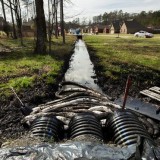UPDATE: Since publication of this story this morning, yet another oil spill has come across the wire – a CP Rail spill from a derailment in northern Ontario – raising the total of spills this past week to SIX.
It’s been another appallingly bad week for proponents of pipeline safety and new oil infrastructure. If the industry’s woeful historical record – from the Exxon Valdez to BP’s Gulf of Mexico catastrophe to Enbridge’s trashing of the Kalamazoo – isn’t enough to turn people off of new pipelines and tanker routes, this slew of recent spills should seal the deal.
These incidents couldn’t have come at a worse time for the oil and pipeline industries, as US President Barack Obama prepares to announce his final decision in the coming months on the proposed Keystone XL pipeline from the Alberta Tar Sands to Port Arthur, Texas.
Let’s review the record over the last week:
- This past friday, ExxonMobil’s Pegasus Pipeline coated the streets of Mayflower, Arkansas with what CNN describes as a “smelly, asphalt-like crude” (i.e. diluted bitumen from the Alberta Tar Sands – the same kind the proposed Keystone XL would carry). These photos illustrate the effects of the spill on the sleepy Little Rock suburb – see the viral video captured by a local resident below.
- Enbridge was back at it again last week, with the fourth recorded spill in two months along its Norman Wells Pipeline through the Northwest Territories. The company has leaked an estimated million litres of oil since February, 2011, from this one pipeline, prompting the National Energy Board to order an engineering assessment of the chronically malfunctioning line.
- Meanwhile, back at the Alberta Tar Sands, Suncor was dealing with (and furiously downplaying) a leak from one of its massive waste ponds into the Athabasca River. This comes on the heels of a leaked memo to Conservative Resources Minister Joe Oliver, which acknowledged routine spillage from these ponds throughout the Tar Sands.
- Over the weekend, Michigan was hit with another spill – this time up to 500 gallons of hydraulic oil spilled into the Lansing Grand River during an equipment malfunction at a local utility.
- For those who would look to rail as an alternative to pipelines for transporting oil, there was the derailment last week of a CP Rail train, spilling an estimated 30,000 gallons of its crude cargo in western Minnesota.
This latest spate of spills should give pause to President Obama as he contemplates the Keystone XL – and to Canadian citizens and lawmakers debating several new pipeline proposals of our own.
It’s time to put to rest the notion that oil spills are “accidents”. They are, rather, a routine function of the business of extracting, transporting, and consuming oil – a good reason to spend our energy and resources on developing sustainable alternatives, not further entrenching our dependence on fossil fuels through new oil infrastructure.


Sunday, 07 April 2013 19:42 posted by madlove
UPDATE: Seven
http://www.rigzone.com/news/oil_gas/a/125587/Coast_Guard_Shell_Pipeline_Spills_Oil_Into_Houston_Area_Bayou
Sunday, 07 April 2013 18:46 posted by Damien Gillis
Dan, the article is very clear about the specific nature of each spill mentioned. In cases where it was dilbit, that’s spelled out – with a link to an excellent piece by Miranda Holmes we published last year (on top of literally dozens of other stories) explaining the specific distinctions between bitumen and conventional light crude and why bitumen is so much more dangerous and undesirable. We don’t say oil sands here – we say Tar Sands for that very reason. So what exactly is your point/complaint? It can only be with the title of the story – the selection of which involves a number of considerations. If you get past the title and actually read the story, then your issue is moot, if I understand you correctly. We are in full agreement that dilbit is not sweet, light crude.
Saturday, 06 April 2013 19:15 posted by Mark
So Dan, why don’t you go knock on everyone’s doors in the spill areas and tell them “It’s OK, it’s only Bitumen.”?
Saturday, 06 April 2013 11:21 posted by Damien Gillis
You’re right, Dan. And dilbit and syncrude much harder on pipelines – as we’re fast learning. This coalition in California is raising questions about the health and environmental impacts of refining low-grade Canadian bitumen in their backyards: http://www.latimes.com/news/local/la-me-0403-dirty-oil-20130403,0,7952694.story
Saturday, 06 April 2013 08:49 posted by dan
Problem is perception. The Michigan spill and the Arkansas spill were NOT OIL SPILLS.
They were BITUMEN SPILLS.
There is a huge difference which requires educating oneself.
Friday, 05 April 2013 20:25 posted by gragor
Oil spills ARE business as usual…
Friday, 05 April 2013 20:24 posted by gragor
Dispatches From Exxon’s Spill Zone
http://www.tarsandsblockade.org/exxonspill-dispatches/
Thursday, 04 April 2013 17:21 posted by Roberta
Remember E. Hunter Harrison? The man that is responsible for the deaths of many and enviromental damage across canada when he was the CEO of CN Rail? He now heads CP Rail. A US import that has once again been unleashed onto Canadian society. This man has blood on his hands and will once again stomp all over us in the name of profits. Keep your eye on him!